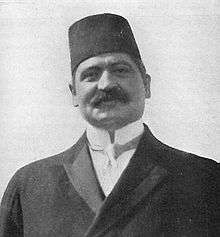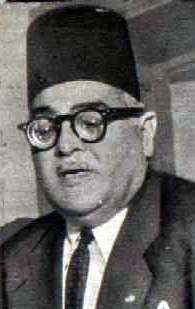Pasha
Pasha or Paşa (Ottoman Turkish: پاشا, Turkish: paşa), in older works sometimes anglicized as bashaw, was a higher rank in the Ottoman Empire political and military system, typically granted to governors, generals, dignitaries and others. As an honorary title, Pasha, in one of its various ranks, is similar to a British peerage or knighthood, and was also one of the highest titles in pre-republican Egypt.
Etymology
According to Etymonline, pasha is derived from the earlier "basha", itself from Turkish "baş/bash" (head, chief), itself from Old Persian pati- "master", (from Proto-Indo-European *poti) and the root of the Persian word shah.[1] According to the Oxford Online Dictionary, the word has its origins in the mid-17th century, and was formed as a result of the combination of the Pahlavi words pati- "lord", and shah.[2] According to Josef W. Meri and Jere L. Bacharach, the word is "more than likely derived from the Persian Padishah".[3] The same view is held by Nicholas Ostler, who mentions that the word was formed as a shortening of the Persian word Padishah.[4] According to etymologist Sevan Nişanyan, the word is derived from Turkish beşe ('boy, prince'), which is cognate with Persian baççe (بچّه).[5] Old Turkish had no fixed distinction between /b/ and /p/, and the word was spelled başa still in the 15th century.[6]
As first used in western Europe, the title appeared in writing with the initial "b". The English forms bashaw, bassaw, bucha etc., general in the 16th and 17th century, derive through the medieval Latin and Italian word bassa. Due to the Ottoman presence in the Arab World, the title became used frequently in Arabic, though pronounced as ba-sha due to the absence of the sound "p" in Arabic.
Role in Ottoman and Egyptian political systems

Within the Ottoman Empire, the Ottoman Sultan had the right to bestow the title of Pasha. It was through this custom that the title (Egyptian Arabic pronunciation: [ˈbæːʃæ]) came to be used in Egypt, which was conquered by the Ottomans in 1517. The rise to power in Egypt in 1805 by Muhammad Ali, an Albanian military commander, effectively established Egypt as a de facto independent state, however, it still owed technical fealty to the Ottoman Sultan. Moreover, Muhammad Ali harboured ambitions of supplanting the Osman Dynasty in Constantinople, and sought to style his Egyptian realm as a successor sultanate to the Ottoman Empire. As such, he bore the title of Pasha, in addition to the official title of Wāli, and the self-declared title of Khedive. His successors to the Egyptian and Sudanese throne, Ibrahim, Abbas, Sa'id, and Isma'il also inherited these titles, with Pasha, and Wāli ceasing to be used in 1867, when the Ottoman Sultan, Abdülaziz officially recognised Isma'il as Khedive.
The title Pasha appears originally to have applied exclusively to military commanders and only high ranking family of the Sultans, but subsequently it could distinguish any high official, and also unofficial persons whom the court desired to honour.
It was also part of the official style of the Alpina Kursuncu Pasha (Great Admiral of the entire Ottoman fleet). Pashas ranked above Beys [pronounce Bae-s] and Aghas, but below Khedives and Viziers [pronounce Vie-zai-iers].
Three grades of Pasha existed, distinguished by the number of yak- or horse-tails (three, two and one respectively; a symbol of Turco-Mongol tradition) or peacock tails, which the bearers were entitled to display on their standard as a symbol of military authority when on campaign* Only the Sultan himself was entitled to four tails, as sovereign commander in chief.
The following military ranks entitled the holder to the style Pasha (lower ranks were styled Bey or merely Effendi):
- The Vizier-i-Azam (Grand Vizier, the prime minister, but also often taking the field as Generalissimo instead of the Sultan)
- Mushir (Field marshal)
- Ferik (army Lieutenant-general or navy Vice-admiral)
- Liva (major general or Rear-admiral)
- The Kizlar Agha (chief black eunuch, the highest officer in the Topkapı Palace; three tails, as commander of the baltadji corps of the halberdiers in the imperial army
- Istanbul's Shaikh ul-Islam, the highest Muslim clergyman, of cabinet rank.
If a Pasha governed a provincial territory, it could be called a pashaluk after his military title, besides the administrative term for the type of jurisdiction, e.g. eyalet, vilayet/walayah. Both Beylerbeys (governors-general) and valis/wālis (the most common type of Governor) were entitled to the style of Pasha (typically with two tails). The word pashalik designated any province or other jurisdiction of a Pasha, such as the Pasha or Bashaw of Tripoli.
Ottoman and Egyptian authorities conferred the title upon both Muslims and Christians without distinction. They also frequently gave it to foreigners in the service of the Ottoman Empire, or of the Egyptian Khedivate (later Sultanate, and Kingdom in turn), e.g. Hobart Pasha.
In an Egyptian context, the Abaza Family is known as "the family of the pashas" for having produced the largest number of nobles holding this title under the Muhammad Ali dynasty and was noted in Egyptian media as one of the main "families that rule Egypt" to this day,[7][8] and as "deeply rooted in Egyptian society and… in the history of the country."[9]
Honorific
As an honorific, the title Pasha was an aristocratic title and could be hereditary or non-hereditary, stipulated in the "Firman" (patent of nobility) issued by the Sultan carrying the imperial seal "Tughra". The title did not bestow rank or title to the wife nor was any religious leader elevated to the title. In contrast to western nobility titles, where the title normally is added before the given name, Ottoman titles followed the given name. In contacts with foreign emissaries and representatives, holders of the title Pasha were often referred to as "Your Excellency".
The sons of a Pasha were styled Pashazada or Pasha-zade, which means just that.
In modern Egyptian and (to a lesser extent) Levantine Arabic, it is used as an honorific closer to "Sir" than "Lord", especially by older people. Among Egyptians born since the Revolution of 1952 and the abolition of aristocratic titles, it is considered a highly informal way of addressing one's male peers.
Although it is no longer an official title, high-ranking officers of the Turkish Armed Forces are often referred to as "pashas" by the Turkish public and media.
In the French Navy, "pasha (pacha in french) is the nickname of the Commanding Officer, similar to the term "skipper" in the anglo-saxon navies.[10]
List of notable pashas
- Abaza Family, Egyptian Pashas and Beys
- Abbas I of Egypt
- Abbas II of Egypt
- Ali Pasha, multiple people
- Baker Pasha (Valentine Baker)
- Barbarossa Khair ad-Din Pasha
- Ahmed Pasha (Claude Alexandre de Bonneval)
- Cigalazade Yusuf Sinan Pasha
- Djemal Pasha
- Pargalı Ibrahim Pasha ("Ibrahim Pasha of Parga"; c. 1495 – 15 March 1536), also known as Frenk Ibrahim Pasha ("the Westerner"), Makbul Ibrahim Pasha ("the Favorite"), which later changed to Maktul Ibrahim Pasha ("the Executed") after his execution in the Topkapı Palace, was the first Grand Vizier of the Ottoman Empire appointed by Sultan Suleiman the Magnificent.
- Dragut, Ottoman Naval Commander & Pasha of Tripoli
- Emin Pasha
- Enver Pasha
- Essad Pasha Toptani
- Fakhri Pasha
- Fekry Pasha Abaza
- Fuad Pasha
- Glubb Pasha (Sir John Bagot Glubb)
- Gordon Pasha (Charles George Gordon)
- Habib Abdoe'r Rahman Alzahier
- Hagop Kazazian Pasha
- Hajji Mustafa Pasha
- Hobart Pasha (Augustus Charles Hobart-Hampden)
- Hussein Refki Pasha
- Ibrahim Edhem Pasha
- İsmet Pasha (İsmet İnönü)
- Jafar al-Askari
- Jamal Pasha
- Judar Pasha, Moroccan general
- Kara Mustafa Pasha
- Hicks Pasha (William Hicks), British Colonel, Hero of the Mahdist Wars
- Kazazian Pasha
- Kilic Ali Pasha
- Multiple members of the Köprülü family
- Lala Kara Mustafa Pasha
- Liman von Sanders Pasha (Otto Liman von Sanders)
- Goltz Pasha (Colmar Freiherr von der Goltz)
- Mahmud Dramali Pasha, Ottoman general
- Marcus Simaika Pasha, was an Egyptian Coptic leader, politician, and founder of the Coptic Museum in Cairo
- Mehmed Pasha Sokolović
- Melling Pasha (Antoine Ignace Melling)
- Midhat Pasha
- Müezzinzade Ali Pasha, Ottoman admiral
- Muhammad Ali Pasha, viceroy of Egypt
- Mustafa Kemal Pasha, subsequently known as Mustafa Kemal Atatürk, founder of the . ost-Ottoman Turkish republic
- Mustafa Reshid Pasha
- Naguib Pasha Mahfouz, is known as the father of obstetrics and gynaecology in Egypt and was a pioneer in obstetric fistula
- Nubar Pasha
- Osman Pasha
- Omar Pasha Latas
- Piyale Pasha
- Radu Bey, Pasha of Wallachia, Brother of Vlad III Tepes; convert to Islam, appointed by Fatih Sultan Mehmet from 1462–1473, representing the only period of direct Islamic rule in Wallachia.
- Riyad Pasha, Egyptian statesman
- Rüstem Pasha the longest serving Grand Vizier of the Ottoman Empire, son-in-law of Sultan Süleyman and his favorite consort and later legal wife Hürrem Sultan, husband of Mihrimah Sultan" Shuja Ahmer Pasha.
- Said Pasha
- Şerif Pasha, Kurdish nationalist
- Sinan Pasha,
- Stone Pasha (Charles Pomeroy Stone)
- Sulejman Pasha
- Sultan al-Atrash
- Talat Pasha
- Tawfiq Bay (Tevfik Pasha), Arab pan-Islamist
- Tewfik Pasha
- Turhan Pasha Përmeti
- Tusun Pasha
- Urabi Pasha
- Vartan Pasha
- Wehib Pasha
- Williams Pasha (Sir William Williams), Canadian/British General
- Woods Pasha (Henry Felix Woods)
- Youssef Wahba Pasha, Egyptian Prime Minister
- Yusuf Murad Pasha (Józef Bem), Polish general and a national hero of Poland and Hungary, who served in the Ottoman Empire.
- Yusuf Karamanli, Pasha of Tripoli
See also
Notes
- ↑ Etymonline.com, s.v. "pasha".
- ↑ "Pasha". Oxford Dictionaries (English). Retrieved 15 April 2017.
- ↑ Josef W. Meri, Jere L. Bacharach. Medieval Islamic Civilization: L-Z, index Taylor & Francis, 2006 ISBN 978-0415966924 page 814
- ↑ Ostler, Nicholas (2010). The Last Lingua Franca: English Until the Return of Babel. Penguin UK. pp. 1–352. ISBN 978-0141922218.
"Even in Ottoman Turkish much military vocabulary is borrowed from Persian. The highest rank, paşa, was a shortening of Persian padišāh 'emperor'.
- ↑ Sevan Nişanyan, Sözlerin Soyağaçı: Çağdaş Türkçenin Etimolojik Sözlüğü ['Family trees of words: Etymologicial Dictionary of Contemporary Turkish'], s.v. "paşa".
- ↑ Tietze, Andreas (2002). "başa". Tarihi ve Etimolojik Türkiye Türkçesi Lugatı (in Turkish). Simurg Kitapçılık. p. 290. ISBN 978-975-7172-56-7.
- ↑ "عائلات تحكم مصر.. 1 ـ 'الأباظية' عائلة الباشوات".
- ↑ http://daharchives.alhayat.com/issue_archive/Hayat%20INT/1998/9/28/%D8%B9%D8%B1%D8%A8-%D8%A7%D9%94%D9%85-%D8%B4%D8%B1%D9%83%D8%B3-%D8%A7%D9%94%D9%85-%D8%AE%D9%84%D9%8A%D8%B7-%D9%85%D9%86%D9%87%D9%85%D8%A7-%D8%B9%D8%A7%D9%8A%D9%94%D9%84%D8%A7%D8%AA-%D8%A7%D9%84%D8%A7%D9%94%D8%A8%D8%A7%D8%B8%D9%8A%D8%A9-%D9%81%D9%8A-%D9%85%D8%B5%D8%B1-%D8%AA%D8%AA%D9%83%D9%8A%D9%81-%D9%86%D9%85%D9%88%D8%B0%D8%AC%D9%8A%D8%A7%D9%8B-%D9%85%D8%B9-%D8%A7%D9%84%D9%85%D8%AA%D8%BA%D9%8A%D8%B1%D8%A7%D8%AA-%D8%A7%D9%84%D8%A7%D8%AC%D8%AA%D9%85%D8%A7%D8%B9%D9%8A%D8%A9-%D9%88%D8%A7%D9%84%D8%AA%D9%82%D9%84%D8%A8%D8%A7%D8%AA-%D8%A7%D9%84%D8%B3%D9%8A%D8%A7%D8%B3%D9%8A%D8%A9.html
- ↑ "Rushdi Abaza, AlexCinema". www.bibalex.org. Retrieved 2012-08-23.
- ↑ (in French)
References
-
 This article incorporates text from a publication now in the public domain: Chisholm, Hugh, ed. (1911). "article name needed". Encyclopædia Britannica (11th ed.). Cambridge University Press.
This article incorporates text from a publication now in the public domain: Chisholm, Hugh, ed. (1911). "article name needed". Encyclopædia Britannica (11th ed.). Cambridge University Press. - AllAboutTurkey.com – The Ottoman harem
- PASHA Restaurant - PASHA Restaurant






